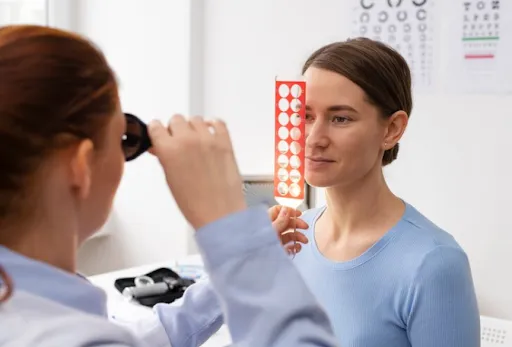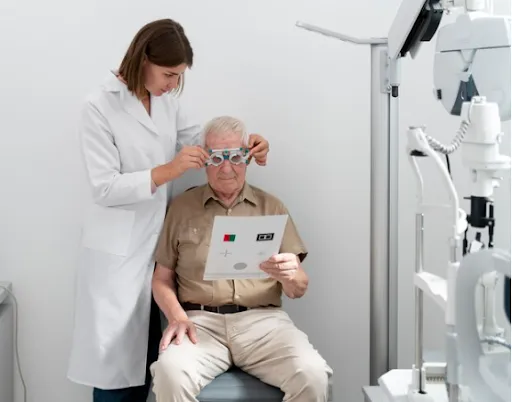Vision and Cognitive Function
The Role of Eye Health in Overall Cognitive Function
FSDAVCFEBFEVSDDVFSD
FSDAVCFEBFEVSDDVFSD
FSDAVCFEBFEVSDDVFSD
How Vision Conditions Affect Cognitive Function
Understanding the link between eye health and cognitive function is crucial, especially for older adults. Conditions such as cataracts, glaucoma, and macular degeneration can impact not only vision but also mental acuity. For instance, cataracts can cause blurred vision, making daily activities challenging and potentially affecting cognitive processes due to reduced sensory input. Similarly, glaucoma and macular degeneration can contribute to cognitive decline by impairing visual information processing.
By addressing vision issues early through routine eye exams, individuals can help prevent complications that might exacerbate cognitive decline. Routine eye care helps in monitoring conditions that may affect both vision and cognitive function, ensuring timely intervention and management.
Understanding the link between eye health and cognitive function is crucial, especially for older adults. Conditions such as cataracts, glaucoma, and macular degeneration can impact not only vision but also mental acuity. For instance, cataracts can cause blurred vision, making daily activities challenging and potentially affecting cognitive processes due to reduced sensory input. Similarly, glaucoma and macular degeneration can contribute to cognitive decline by impairing visual information processing.

By addressing vision issues early through routine eye exams, individuals can help prevent complications that might exacerbate cognitive decline. Routine eye care helps in monitoring conditions that may affect both vision and cognitive function, ensuring timely intervention and management.

The Connection Between Vision and Brain Health
The relationship between eye health and brain health is complex and multifaceted. Vision loss due to conditions like cataracts or glaucoma can significantly impact a person's quality of life. When vision deteriorates, it often leads to decreased engagement in daily activities and social isolation. These factors are known to influence cognitive function, as reduced sensory input and less mental stimulation can contribute to cognitive decline. Studies have highlighted that untreated vision problems can increase the risk of cognitive issues, underscoring the importance of proactive eye care.
Regular visits to an eye care professional are essential for managing eye conditions and preserving cognitive health. Through routine eye exams, professionals can detect and address issues early, helping to prevent further deterioration that might affect mental acuity. Addressing vision problems promptly can help maintain engagement in daily activities and social interactions, which are crucial for cognitive well-being.
For more detailed information on how to maintain both cognitive and visual health, visit our Senior Eye Health page This resource provides valuable insights into how age-related eye conditions impact overall well-being and offers guidance on effective management strategies to support both eye and brain health.
Preventing Cognitive Decline Through Vision Care

Proactive vision care plays a significant role in preventing cognitive decline. Simple practices, such as regular eye exams and early treatment for vision issues, can help mitigate the effects of conditions that might otherwise lead to cognitive problems. Poor vision has been linked to an increased risk of dementia and cognitive impairment, making early intervention essential for preserving both eye health and mental sharpness. By addressing vision problems promptly, individuals can support their cognitive function and maintain a higher quality of life as they age.
In addition to vision care, maintaining a healthy lifestyle, including a balanced diet and regular exercise, supports both eye and brain health. Our Eye Conditions page provides further details on various conditions and their management, helping individuals stay informed and proactive about their eye and cognitive health.

Incorporating lifestyle practices such as a nutritious diet and regular exercise into your daily routine can significantly impact overall well-being. A balanced diet, rich in essential nutrients like omega-3 fatty acids, vitamins C and E, and zinc, supports both eye and brain health. These nutrients are known to protect against age-related eye conditions, such as macular degeneration and cataracts. Regular physical activity also promotes healthy blood flow, which is beneficial for maintaining vision and cognitive function. By integrating these habits into your life, you can improve both visual and mental acuity.
For more information on various eye conditions and how to manage them effectively, Contact us today. This page offers comprehensive details on different eye issues, providing practical steps for maintaining both visual and cognitive health. Staying informed and proactive through regular eye care and healthy lifestyle choices is crucial for supporting your overall well-being and ensuring long-term eye and brain health.
Why Regular Eye Exams Are Essential
Regular eye exams are essential for monitoring and managing conditions that could affect cognitive function. These exams are crucial for detecting early changes in vision and addressing issues that might contribute to cognitive decline. By staying on top of eye health, individuals can prevent or minimize the impact of vision-related problems on mental acuity. Early detection and intervention through regular eye care help maintain overall well-being and support cognitive health.
For more information on the benefits of regular eye exams and how they contribute to overall health, visit our Routine Eye Exams page This resource outlines the importance of consistent eye care and provides insights into how routine exams can help maintain both visual and cognitive health. Ensuring regular eye check-ups is a proactive step towards preserving your vision and supporting cognitive function throughout life.
Comprehensive Vision Care for Cognitive Support
A comprehensive approach to vision care supports cognitive health by addressing various eye conditions that can impact mental function. Comprehensive eye exams, tailored treatments, and regular monitoring are essential for managing conditions such as cataracts, glaucoma, and macular degeneration. These practices help in maintaining optimal vision, which in turn supports cognitive well-being. Furthermore, proactive management of eye conditions can prevent complications that might exacerbate cognitive decline, ensuring that both visual and mental health are preserved throughout life.
Incorporating vision care into a broader health strategy, including regular check-ups and preventive measures, ensures that both eye and cognitive health are preserved. For a thorough understanding of how comprehensive vision care supports cognitive function, visit our Vision Care Services page, which details various services aimed at maintaining eye and cognitive health.
A comprehensive approach to vision care supports cognitive health by addressing various eye conditions that can impact mental function. Comprehensive eye exams, tailored treatments, and regular monitoring are essential for managing conditions such as cataracts, glaucoma, and macular degeneration. These practices help in maintaining optimal vision, which in turn supports cognitive well-being. Furthermore, proactive management of eye conditions can prevent complications that might exacerbate cognitive decline, ensuring that both visual and mental health are preserved throughout life.

Incorporating vision care into a broader health strategy, including regular check-ups and preventive measures, ensures that both eye and cognitive health are preserved. For a thorough understanding of how comprehensive vision care supports cognitive function, visit our Vision Care Services page, which details various services aimed at maintaining eye and cognitive health.

Managing Vision Conditions to Prevent Cognitive Decline
Effectively managing vision conditions is crucial for preventing cognitive decline and maintaining overall cognitive health. Conditions such as cataracts, glaucoma, and macular degeneration can significantly impact cognitive function if left untreated. Cataracts can blur vision and impair daily activities, while glaucoma can lead to gradual vision loss that affects one's ability to engage in mentally stimulating activities. Macular degeneration, on the other hand, can result in central vision loss, affecting tasks that require sharp vision and potentially leading to decreased cognitive engagement. Regular eye exams and timely treatment are key to managing these conditions and mitigating their impact on cognitive health.
Regular eye exams play a vital role in detecting and addressing vision issues before they progress to more serious stages. Early detection allows for the implementation of appropriate treatments, such as medication, surgery, or lifestyle adjustments, to manage conditions effectively. By staying proactive with eye care, individuals can prevent or slow the progression of vision problems, which in turn helps in preserving cognitive function. Comprehensive vision care ensures that eye conditions are monitored and managed appropriately, supporting overall mental well-being.
Additionally, integrating vision care into a broader health strategy that includes a balanced diet, regular exercise, and mental stimulation can further enhance cognitive health. These practices work synergistically to support both visual and cognitive function, helping to maintain a high quality of life. For more detailed information on managing vision conditions and preventing cognitive decline, visit our Vision Care Services page .
By prioritizing comprehensive vision care and adopting a holistic approach to health, individuals can effectively manage vision conditions and support their cognitive well-being throughout their lives. This proactive strategy is essential for maintaining both visual clarity and mental acuity, ensuring long-term health and quality of life.
Maintaining Cognitive Function Through Eye Health
Maintaining cognitive function is closely tied to managing eye health. Regular eye care and early treatment of vision problems are crucial for preserving mental acuity and overall quality of life. By staying proactive and informed about vision issues, individuals can ensure that their vision remains clear and their cognitive health remains robust. This integrated approach helps in preventing complications and supports a healthier, more active lifestyle. Furthermore, fostering a healthy lifestyle that includes proper nutrition and mental exercises can complement vision care, enhancing both cognitive and visual well-being over time

Maintaining cognitive function is closely tied to managing eye health. Regular eye care and early treatment of vision problems are crucial for preserving mental acuity and overall quality of life. By staying proactive and informed about vision issues, individuals can ensure that their vision remains clear and their cognitive health remains robust. This integrated approach helps in preventing complications and supports a healthier, more active lifestyle. Furthermore, fostering a healthy lifestyle that includes proper nutrition and mental exercises can complement vision care, enhancing both cognitive and visual well-being over time
For further details on how to manage eye health and support cognitive function, explore our Vision and Mental Acuity page . This resource provides valuable information on maintaining both visual and cognitive well-being, helping you take the necessary steps to support your overall health.
For further details on how to manage eye health and support cognitive function, explore our Vision and Mental Acuity page . This resource provides valuable information on maintaining both visual and cognitive well-being, helping you take the necessary steps to support your overall health.
Final Thoughts on Eye Health and Cognition
Understanding the connection between eye health and cognitive function underscores the importance of regular eye care. Effective management of vision conditions and proactive eye care play a crucial role in supporting cognitive health and overall quality of life. Regular eye exams and early intervention help detect and address issues before they escalate, preserving both visual clarity and mental acuity.
Consistent eye care is essential for maintaining good vision and cognitive function. By staying informed and proactive about eye health, individuals can mitigate the risk of cognitive decline and enhance their overall well-being. For more guidance on maintaining both eye and cognitive health, visit our Eye Health Resources page. This page offers valuable information and support to help you take the necessary steps for optimal vision and mental health.

Contact Info
Hours of Operation
Mon - Fri | 9:00 AM - 5:00 PM
Sat - Sun | Closed
Holiday Hours: We are closed for the following holidays: New Years Day, Memorial Day, Independence Day, Labor Day, Thanksgiving Day, Christmas Day
© 2026 Kleinwood Vision. All rights Reserved.


